Africa
Paramilitary RSF attacks leave Port Sudan without power
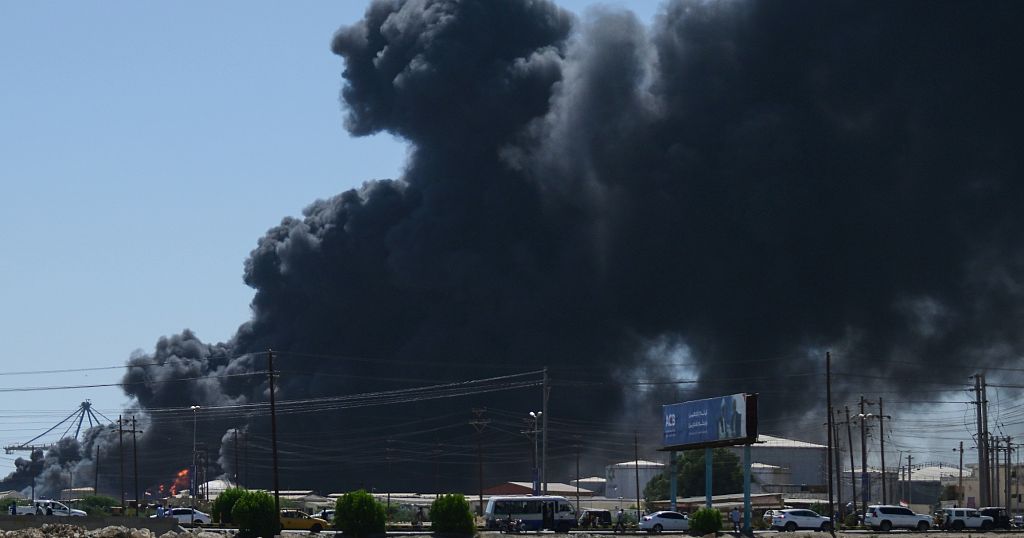
Drone strikes have hit a major power station in Port Sudan on Tuesday, causing “a complete power outage” in the eastern Sudanese city, the country’s electricity provider told the BBC.
The barrage occurred as the paramilitary RSF continue to heighten attacks on Port Sudan, after launching their first strikes on the city this weekend.
The RSF unleashed drones on other key targets early Tuesday. One drone hit the civilian part of the city’s international airport, causing flights to be cancelled. Another drone hit an army base in the city centre and a third one struck a fuel depot near the port.
Witnesses say a hotel located close to the residence of army chief Abdel Fattah al-Burhan was also hit in the attack. There were no reported casualties.
Sudan Information Minister Khalid Aleiser visited the southern part of the port, where fuel tanks were reportedly hit. He slammed the United Arab Emirates, saying it was arming the RSF. The UAE rejected the accusation and condemned the attacks.
The RSF is targeting Port Sudan for the third day in a row. The city had previously been spared in Sudan’s two-year war.
On Sunday, strikes hit the military part of the airport, followed by the targeting of fuel depots on Monday. In both cases, military sources blamed the RSF. The paramilitary has not commented on the attacks.
The United Nations has temporarily suspended all aid flights in and out of Port Sudan but maintains regular aid operations. “None of our offices, premises or warehouses have been impacted, and we continue to carry out our regular operations”, said Farhan Haq, the UN deputy spokesperson.
The city was once seen as a safe haven for displaced people. It had become the de facto seat of the army-aligned government since the RSF first invaded Khartoum two years ago.
The city also welcomed hundreds of thousands of displaced people. The recent attacks are likely to worsen the humanitarian crisis in Sudan.
Two years into the war, the army has succeeded in pushing the RSF out of most of central Sudan, and the paramilitary has shifted tactics from ground incursions to drone attacks.
Africa
New wave of Sudanese refugees flee into neighbouring Chad

Large numbers of Sudanese refugees are pouring into eastern Chad with more than 18,500 people arriving in the past two weeks alone, the United Nations refugee agency (UNHCR) said.
After the bombing of the Zamzam camp for internally displaced people in Darfur and the city of al-Fasher, it says hundreds of thousands of people are on the move.
Many of them, including children, elderly people, and pregnant women, are severely malnourished.
“We didn’t expect this big influx of people,” says Jean-Paul Habamungu, head of the UNHCR sub-office in Chad.
“It’s terrible here at the border, many children, unaccompanied children like the one of 14 years we just met, this boy of 9 years who is crying here looking for their parents.”
Habamungu says there are also many people with specific needs including pregnant and lactating women who are malnourished.
“So we expect more malnourished people coming now, talking about people who are dying on their way from Zamzam to between Tawila and Tiné, dying with hunger.”
The UNHCR says some 76% of them have lived through traumatic experiences such as sexual violence, extortion, and theft.
In addition, it says Chad is struggling to take in the new arrivals.
It already hosts some 1.3 million refugees, including 794,000 who have fled Sudan since the civil war started there over two years ago.
Humanitarian resources across the country are severely limited, impacting the ability to provide water, shelter, health, education, and protection.
Last month, Sudan’s paramilitary Rapid Support Forces stormed into the Zamzam camp and went on a three-day rampage, killing at least 400 people, after months of starving its population with a siege.
Refugees and aid workers say RSF fighters gunned down men and women in the streets, beat and tortured others, and raped and sexually assaulted women and girls.
The 11 April attack was the worst ever suffered by Zamzam, Sudan’s largest displacement camp, in its 20 years of existence.
Once home to some 500,000 residents, the camp has been virtually emptied.
The RSF also destroyed Zamzam’s only functioning medical centre, killing nine workers from Relief International.
Much of the south and east of the camp was burned to the ground, the General Coordination said.
Africa
South Africa’s DA party goes to court over employment equity quota

South Africa’s Democratic Alliance (DA) party went to court on Tuesday to challenge the Employment Equity Amendment Act, in the latest crisis in the country’s government of national unity.
It strongly opposes section 15(A) of the new law which allows the labour minister to introduce numerical targets in some economic sectors.
This will require businesses with more than 50 employees to ensure their workforce reflects historically disadvantaged groups, including black people, women, and those living with disabilities.
The DA argues that this is unconstitutional and that employment should be based on skill and merit, rather than race, gender, or disability status.
It has described the legislation as “anti-transformative” and says it will result in job losses.
The African National Congress (ANC) party labour minister has labelled the legal action as a “clear attempt to halt transformation in the workplace and preserve historical inequalities”.
The court battle signals the latest clash between the DA and the ANC, the two biggest parties in government of national unity.
A recent challenge to a planned increase in Value Added Tax saw them at loggerheads, with many suggesting the fragile unity government could collapse as a result of their differences.
That conflict was resolved through a court challenge by the DA, supported by the Economic Freedom Fighters party, which saw the country scrap plans to hike VAT by 1 percentage point over two years.
Africa
Israeli cabinet approves plans to capture all of the Gaza Strip

More hardship in store for the embattled population of Gaza as the Israeli cabinet on Monday approved plans to capture the entire Palestinian enclave and stay there for an unspecified amount of time.
It also calls for hundreds of thousands of people to move to Gaza’s south and would see Israel take over aid deliveries to the devastated territory.
A spokesperson for United Nations Secretary-General Antonio Guterres says he’s “alarmed” by the Israeli decision.
Israel’s army spokesperson, Brigadier General Effie Defrin, said the objective of the operation is to “return our hostages, topple and subdue the Hamas regime”.
“These two goals are intertwined. The operation will include a broad offensive that includes moving a majority of Gaza’s population to protect it in a sterile area from Hamas,” he said.
This would likely amount to their forcible displacement and exacerbate an already dire humanitarian crisis in the enclave.
Defrin added that the operation would include “continued airstrikes, the elimination of terrorists, and the dismantling of infrastructure”.
Details of the plan were not formally announced, and its exact timing and implementation were not clear.
Its approval came hours after the Israeli military chief said the army was calling up tens of thousands of reserve soldiers.
An defence official said the operation would not begin until after US President Donald Trump wraps up his expected visit to the Middle East this month.
The announcement has angered the families of the remaining Israeli hostages held in Gaza, who fear that any extension of the conflict will endanger their loved ones.
Hundreds of people gathered outside the Israeli parliament in Jerusalem on Monday to protest against Israeli Prime Minister Benjamin Netanyahu and his government, calling for a deal to release the captives.
Israel says 59 hostages remain in Gaza, although about 35 of them are believed to be dead.
Since Israel ended a ceasefire with the Hamas militant group in mid-March, it has unleashed fierce strikes on the territory that have killed hundreds.
It has captured swathes of territory and now controls roughly 50 per cent of the enclave.
The war began when Hamas-led militants attacked southern Israel, killing 1,200 people and taking about 250 hostages.
Israel’s offensive has displaced more than 90 per cent of Gaza’s population. Palestinian health officials say more than 52,000 people there have been killed, many of them women and children.
The officials do not distinguish between combatants and civilians in their count.
-

 Europe2 days ago
Europe2 days agoRwanda in talks to receive migrants deported from US, foreign minister says
-

 Sports2 days ago
Sports2 days agoOlympic swim great Gary Hall Jr. awarded 10 medals to replace those destroyed in LA fires
-
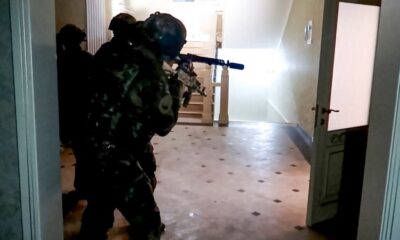
 Conflict Zones2 days ago
Conflict Zones2 days agoGunmen kill three police officers in southern Russia’s Dagestan region | Crime News
-

 Middle East2 days ago
Middle East2 days agoIsrael bombs Yemen’s Hodeidah port after attack near Tel Aviv | Politics News
-
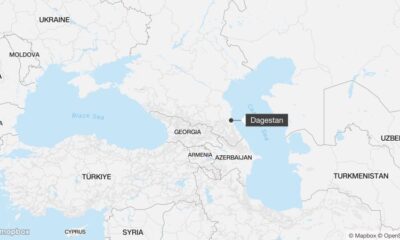
 Europe2 days ago
Europe2 days agoThree police officers shot dead in Russia’s Dagestan
-
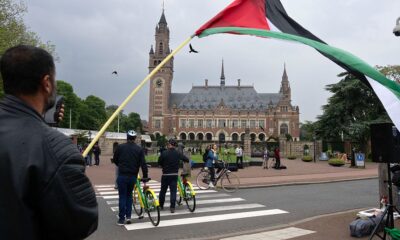
 Africa2 days ago
Africa2 days agoDemonstrators angry at ICJ’s decision to dismiss Sudan’s genocide case against UAE
-
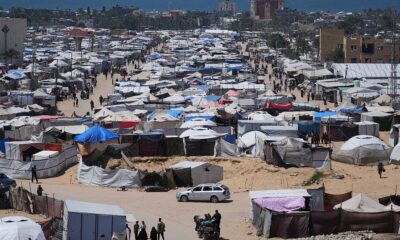
 Africa2 days ago
Africa2 days agoIsraeli cabinet approves plans to capture all of the Gaza Strip
-
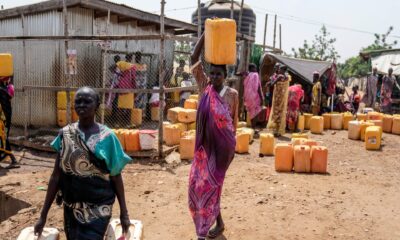
 Conflict Zones1 day ago
Conflict Zones1 day ago‘We are suffering’: Displaced families bear burden of South Sudan conflict | Humanitarian Crises News




